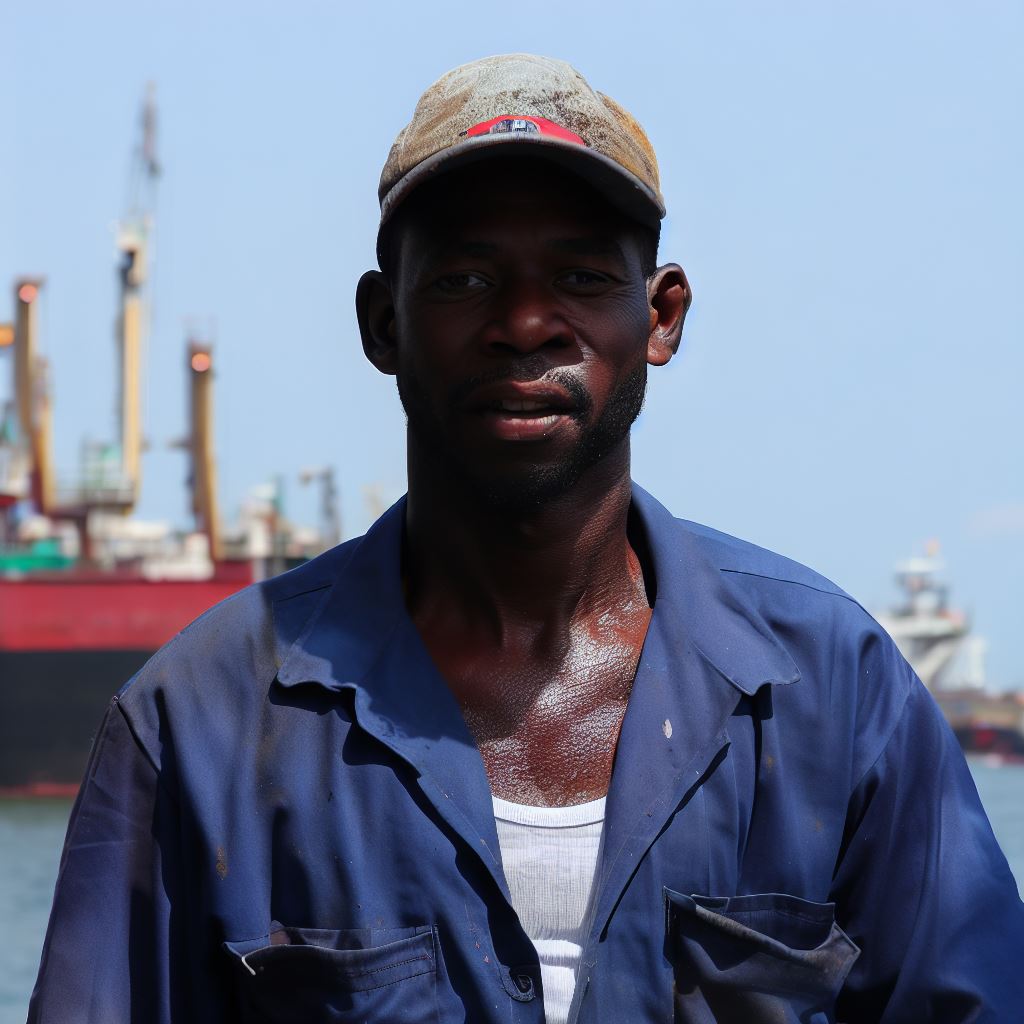Introduction
Sailing and oiling play a vital role in Nigeria’s economy and transport sector. Sailors and oilers in Nigeria face numerous challenges in their profession.
Sailing and oiling have always been crucial for Nigeria’s economy and transport sector.
Nigeria is a maritime nation with abundant natural resources, especially oil, which makes sailing and oiling highly significant in this country.
These professions are not only crucial for the economic growth of the nation but also for international trade and the transportation of goods and people.
Unfortunately, sailors and oilers in Nigeria face several challenges that hinder their profession. The first challenge they encounter is inadequate infrastructure and maintenance of ports and maritime facilities.
Insufficient investment in these areas makes it difficult for sailors and oilers to efficiently carry out their duties. Inadequate port facilities lead to delays, higher operational costs, and safety risks.
Another challenge faced by these professionals is piracy and maritime security threats. Nigeria’s coastline has been plagued by pirate attacks and acts of terrorism, which puts the lives of sailors and oilers at risk.
Pirates often hijack vessels, steal the cargo, and even kidnap crew members for ransom.
This constant threat not only affects the physical safety of sailors and oilers but also raises the cost of insurance and shipping expenses.
Furthermore, the lack of proper training and certification programs is a significant challenge for sailors and oilers in Nigeria.
Without adequate training, they may lack the necessary skills and knowledge to navigate the waters safely and efficiently handle oil-related operations.
This issue not only compromises their own safety but also poses environmental risks in case of accidents or spills.
In essence, sailors and oilers in Nigeria face numerous challenges in their profession.
Inadequate infrastructure, piracy, and a lack of proper training all contribute to the difficulties these individuals encounter daily.
It is crucial for the Nigerian government and relevant authorities to address these challenges and provide support to ensure a safe and prosperous environment for sailors and oilers.
Safety Concerns
Lack of proper safety regulations and enforcement in the maritime industry
- The maritime industry in Nigeria lacks adequate safety regulations and their enforcement.
- This absence of regulations creates a hazardous working environment for sailors and oilers.
- Without proper guidelines, safety standards are not met, increasing the risk of accidents.
- The lack of enforcement contributes to a culture of negligence when it comes to safety protocols.
- Unsafe working conditions in the maritime industry are prevalent due to this lack of regulation.
High risk of accidents and injuries due to working conditions
- Sailors and oilers in Nigeria face a high risk of accidents and injuries in their day-to-day work.
- Working on ships and oil rigs involves tasks that are physically demanding and potentially dangerous.
- Long working hours without proper rest can lead to fatigue, increasing the likelihood of accidents.
- Challenging weather conditions, such as rough seas and storms, further heighten the risk.
- Inadequate safety measures and poor maintenance of equipment add to the danger sailors and oilers face.
Insufficient safety training and equipment for sailors and oilers
- Sailors and oilers often lack sufficient safety training and knowledge to handle risky situations.
- Many of them are untrained or have outdated training due to inadequate resources and funding for training programs.
- Their unfamiliarity with proper safety protocols puts their lives and the lives of their crewmates at risk.
- In addition, the maritime industry in Nigeria often lacks proper safety equipment, such as life jackets and fire extinguishers.
- The absence of necessary equipment further increases the vulnerability of sailors and oilers.
In fact, safety concerns are a significant challenge faced by sailors and oilers in Nigeria’s maritime industry. The lack of proper safety regulations and enforcement leads to a hazardous working environment.
This, combined with the high risk of accidents and injuries due to working conditions, poses a constant threat to the safety of sailors and oilers.
Furthermore, insufficient safety training and equipment exacerbate the dangers they face.
It is crucial for the Nigerian maritime industry to prioritize safety and address these challenges through the implementation of proper regulations, enforcement measures, adequate training programs, and the provision of necessary safety equipment.
Only then can the lives and well-being of sailors and oilers be effectively protected.
Read: Working as a Marine Oiler in Nigeria: Tips and Insights
Piracy and Security Issues
Piracy and security issues pose significant challenges to sailors and oilers in Nigeria today.
With an increasing number of incidents occurring in Nigerian waters, their safety and job security are at stake due to the lack of effective security measures.
Increasing incidents of piracy in Nigerian waters
Nigeria has witnessed a surge in maritime piracy, particularly in its territorial waters.
Pirates, armed with sophisticated weapons, target ships and hijack them for various reasons, such as ransom demands or theft of valuable cargo.
These acts of piracy not only endanger the lives of sailors and oilers but also disrupt the smooth functioning of maritime operations.
The frequency and audacity of these attacks are a serious concern for the Nigerian maritime industry.
Lack of effective security measures to protect sailors and oilers
One of the major challenges faced by sailors and oilers in Nigeria is the absence of adequate security measures.
The maritime authorities and government need to prioritize the safety and protection of these workers.
Currently, insufficient efforts have been made to combat piracy and enhance security in Nigerian waters.
There is a lack of surveillance systems, patrol vessels, and trained personnel to tackle pirate attacks effectively.
Without proper security measures in place, sailors and oilers remain vulnerable to piracy and its detrimental consequences.
Implications of piracy on the wellbeing and job security of maritime workers
The rise in piracy directly affects the wellbeing and job security of sailors and oilers in Nigeria.
These workers face physical and psychological risks while on duty, which can cause long-lasting trauma and stress.
The fear of pirate attacks also leads to a decline in the number of individuals willing to pursue careers in the maritime industry.
This scarcity of skilled personnel can hamper the overall productivity and growth of the industry.
Furthermore, piracy incidents may result in sailors and oilers losing their jobs or having their work contracts terminated due to the increased operational risks and insurance costs associated with piracy-prone areas.
Overall, the implications of piracy on the wellbeing and job security of maritime workers in Nigeria are severe, necessitating urgent action to protect their rights and safety.
In short, pirate attacks and inadequate security measures are major challenges encountered by sailors and oilers in Nigeria.
The increasing incidents of piracy, lack of effective security measures, and the implications on the wellbeing and job security of maritime workers necessitate immediate measures to improve the overall safety and protection of these individuals.
Read: The Role of Sailors in Nigeria’s Maritime Economy
Exploitative Employment Practices
Unfair labor conditions and low wages for sailors and oilers
- Sailors and oilers in Nigeria today face numerous challenges related to exploitative employment practices.
- One major issue is the prevalence of unfair labor conditions that they have to endure.
- These conditions include long working hours, lack of rest periods, and unsafe working environments.
- Additionally, sailors and oilers often receive low wages that are not commensurate with the demanding nature of their work.
- This creates a significant financial burden on them and their families, leading to a cycle of poverty.
Prevalence of contract-based employment without adequate benefits
- Another challenge faced by sailors and oilers is the widespread use of contract-based employment.
- Many workers are hired on short-term contracts without any job security or employment benefits.
- Without stable employment, sailors and oilers are constantly worried about losing their jobs, which affects their overall well-being.
- The absence of benefits such as health insurance and retirement plans further exacerbates their precarious situation.
- This lack of stability and security creates a sense of vulnerability among sailors and oilers, making it difficult for them to plan for the future.
Exploitation by middlemen and hiring agencies
- Sailors and oilers in Nigeria also face exploitation by middlemen and hiring agencies.
- These intermediaries often charge exorbitant fees in exchange for securing employment opportunities.
- Many sailors and oilers become trapped in debt bondage as they struggle to pay off these fees.
- Additionally, some middlemen and agencies engage in exploitative practices such as withholding wages or providing substandard living conditions.
- These exploitative tactics further contribute to the challenges and hardships faced by sailors and oilers in Nigeria.
In general, sailors and oilers in Nigeria today encounter various challenges due to exploitative employment practices.
Unfair labor conditions and low wages lead to financial struggles and a cycle of poverty. Contract-based employment without adequate benefits creates instability and insecurity for these workers.
Furthermore, exploitation by middlemen and hiring agencies adds to their difficulties.
It is crucial for the government and relevant authorities to address and rectify these issues, ensuring fair treatment and better working conditions for sailors and oilers in Nigeria.
Read: Marine Oilers in Nigeria: Salary, Benefits, and Growth

Health and Wellbeing
Adverse effects of long working hours and extended time away from home
The health and wellbeing of sailors and oilers in Nigeria face numerous challenges in their daily lives. Long working hours and extended time away from home have adverse effects on their overall wellbeing.
The demanding nature of their jobs often leads to physical exhaustion, fatigue, and sleep disorders.
Additionally, being away from loved ones for extended periods can result in feelings of loneliness and homesickness, affecting their mental health and personal relationships.
The lack of work-life balance and high-pressure environment contribute to job-related stress, which can further impact their mental wellbeing.
Mental health challenges arising from isolation and job-related stress
Isolation at sea compounds these challenges, leading to depression, anxiety, and social disconnection. Limited communication with family and friends exacerbates the feelings of loneliness and isolation.
Traumatic events at sea may also contribute to post-traumatic stress disorder (PTSD) among sailors and oilers.
Without appropriate mental health support, individuals may resort to harmful coping mechanisms, such as substance abuse, to deal with their emotional struggles.
Limited access to healthcare facilities and medical assistance while at sea
The limited access to healthcare facilities and medical assistance while at sea adds another layer of complexity to their healthcare needs.
Remote locations and limited resources make it challenging to access proper medical care.
Small medical facilities onboard may not have the necessary equipment or expertise to handle serious medical emergencies.
Delays in receiving medical assistance can worsen health conditions and lead to further complications.
Sailors and oilers may also struggle to receive timely treatment for chronic illnesses or injuries, putting their health at risk.
Inadequate healthcare provisions onboard increase the risk of illness spreading among the crew, compromising their overall health and wellbeing.
It is crucial for the maritime industry and relevant authorities to prioritize the health and wellbeing of sailors and oilers in Nigeria.
Measures should be implemented to address the adverse effects of long working hours, provide adequate mental health support, and ensure access to quality healthcare facilities and medical assistance while at sea.
Read: Sailor Training Programs in Nigeria: A Comprehensive Guide
Environmental Hazards
Oil spills and pollution in Nigerian waters affecting sailors and oilers
Sailors and oilers in Nigeria face numerous challenges due to environmental hazards, starting with oil spills and pollution in Nigerian waters.
The high frequency of oil spills in Nigerian waters can have disastrous consequences for both the marine ecosystem and the people who depend on it.
These spills not only harm marine life but also make navigation treacherous for sailors and oilers.
Furthermore, the polluted waters can damage ships and vessels, leading to costly repairs and potential accidents.
The cleanup efforts required after oil spills and the subsequent restoration of the marine environment pose significant challenges to sailors and oilers.
Lack of proper waste management practices on ships and vessels
In addition to oil spills, the lack of proper waste management practices on ships and vessels is another challenge faced by sailors and oilers in Nigeria.
Without effective waste management systems, ships generate substantial amounts of waste that can contaminate the marine environment.
Improper disposal of garbage and hazardous materials not only pollutes the waters but also poses health risks to those working on board.
It is crucial for sailors and oilers to have access to appropriate waste management facilities and be educated on proper disposal methods.
Implementing strict regulations and monitoring mechanisms can help address this issue and minimize the negative impact of waste on the environment.
Negative impact of environmental hazards on the physical and mental health of workers
The environmental hazards faced by sailors and oilers in Nigeria also take a toll on their physical and mental well-being.
Constant exposure to polluted waters and hazardous substances can lead to various health problems such as respiratory issues, skin disorders, and even chronic diseases.
Moreover, the stressful nature of their work combined with the adverse environmental conditions can affect the mental health of sailors and oilers.
The lack of proper medical facilities and support further exacerbates the challenges faced by these workers.
Efforts should be made to raise awareness about the potential health risks and provide necessary healthcare services to safeguard the well-being of sailors and oilers.
Lack of Career Advancement Opportunities
Sailors and oilers in Nigeria face numerous challenges in their career development.
The lack of career advancement opportunities hinders their professional growth and skill enhancement, ultimately affecting their overall job satisfaction.
Limited opportunities for professional growth and skill development
- Scarce chances for sailors and oilers to improve their skills and upgrade their knowledge.
- Insufficient access to specialized training programs and workshops.
- Absence of mentorship and guidance to nurture their potential in the field.
- Inadequate exposure to new technologies and advancements in the maritime industry.
- Limited networking opportunities to collaborate and learn from industry experts.
Insufficient training and educational programs for sailors and oilers
- Lack of well-structured and comprehensive training programs for sailors and oilers.
- Inadequate funding and resources allocated towards professional development.
- Shortage of institutions offering specialized courses relevant to their job requirements.
- Outdated curricula failing to address the emerging challenges and needs of the industry.
- Ineffectiveness of existing training programs in bridging competency gaps.
Stagnation in career progression due to lack of industry support
- Absence of a structured career framework and growth trajectory for sailors and oilers.
- Inadequate recognition and appreciation for their contributions in the maritime sector.
- Limited opportunities for promotion and higher positions in their respective field.
- Lack of guidance and support from industry leaders to navigate career progression.
- Inequality in opportunities based on factors like gender, nationality, and connections.
The dearth of career advancement opportunities has severe implications for the motivation and retention of sailors and oilers in Nigeria.
The lack of access to skill development programs and resources hinders their ability to meet the evolving demands of the industry.
The absence of a clear career progression path discourages their ambition and commitment to the field.
Addressing these challenges
To address these challenges, it is crucial for the maritime industry in Nigeria to prioritize the following:
Establishing comprehensive training and educational programs
The industry should collaborate with educational institutions to create specialized courses and apprenticeship programs.
These initiatives should be designed to enhance the technical skills and knowledge of sailors and oilers, keeping pace with advancements in the maritime sector.
Promoting mentorship and professional guidance
Encouraging experienced industry professionals to mentor sailors and oilers will provide valuable guidance for career progression.
Mentorship programs can help cultivate leadership qualities and assist in overcoming industry-specific challenges.
Publish Your Professional Profile, Business or Brand
Showcase your expertise, gain trust, and boost visibility instantly on Professions.ng.
Publish NowEnsuring equal career opportunities
It is crucial to establish transparent and merit-based selection processes for promotions and higher positions.
Efforts should be made to eliminate any form of bias and discrimination, fostering an inclusive environment where talent and competence are the sole criteria for career advancement.
Encouraging industry collaboration and networking
Organizations should facilitate platforms for sailors and oilers to connect with industry experts, share knowledge, and seek guidance.
Collaborative initiatives can help in fostering a learning culture and staying updated with the latest trends and practices in the maritime sector.
By addressing the lack of career advancement opportunities, Nigeria can empower its sailors and oilers to thrive professionally, leading to a more vibrant and skilled maritime workforce in the country.
Conclusion
Recap of the challenges faced by sailors and oilers in Nigeria
- Limited safety regulations
- Poor working conditions
- Inadequate training and education opportunities
- Low wages and benefits
- Risk of piracy and attacks
Call to action for improved regulations, safety measures, and support for maritime workers
- Stronger enforcement of existing regulations
- Investment in infrastructure and equipment
- Provision of necessary training and education programs
- Ensuring fair and competitive wages
- Enhanced security measures to combat piracy
Emphasis on the importance of recognizing and addressing these challenges for the betterment of the industry and its workers
- Creating a safer and more conducive working environment
- Increasing job satisfaction and retention rates
- Boosting the overall efficiency and productivity of the maritime sector
- Ensuring the sustainable growth and development of Nigeria’s maritime industry




